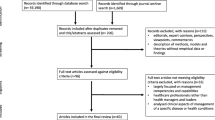Abstract
In Canada, there is growing recognition that women play an increasingly important role in the working world. Management training programs for women have been considered as a route to prepare women to be more effective managers. This paper highlights some of the major issues and concerns being discussed outside Canada by those engaged in management education and training for women — objectives and content of programs, nature of participants, training methods, choice of trainers, organization and evaluation of programs. References are made to a few international programs to illustrate how some of these concerns have been addressed. Implications for training programs in Canada, from both practical as well as research points of view, are discussed.
Similar content being viewed by others
References
Ames, M. and Heide, D.: 1985, ‘Training and Developing Women Managers: Are They Really a Special Case?’, in B. A. Stead, Women in Management, 2nd edition (Prentice Hall, Englewood Cliffs, New Jersey), pp. 28–38.
Bargh, L.: 1986, ‘Awareness Raising through Training’, in Cooke, A. (ed.), Women and Training: Developing a Major Resource, Journal of European Industrial Training 10, pp. 23–7.
Berryman-Fink, C. and Fink, C. B.: 1985, ‘Optimal Training for Opposite-sex Managers’, Training and Development Journal 39, pp. 27–9.
Boydell, T., Pedler, M. and Hammond, V.: 1986, ‘Self-development Groups for Women Managers’, Manpower Services Commission, London.
Brenner, O.C., Tomkiewicz, J., and Schein, V. E.: 1989, ‘The Relationship Between Sex Role Stereotypes and Requisite Management Characteristics Revisited’, Academy of Management Journal 32, pp. 662–9.
Carter, J.: 1980, ‘New Directions Needed in Management Training Programs for Women’, The Texas Business Executive 6, pp. 22–4, 27.
Clegg, W. H.: 1987, ‘Management Training Evaluation: An Update’, Training and Development Journal 41, pp. 65–71.
Cullen, D.: 1987, ‘Management Training for Women: An Argument for Different Programs’, Proceedings of the Workshops on Women, Training and Management (Centre for International Business Studies, Ecole des Hautes Etudes Commerciales, August), pp. 40–9.
da Rocha, A.: 1987, ‘The Training of Women in Management: Some Considerations about MBA Programs in Brazil’, Proceedings of the Workshops on Women, Training and Management (Centre for International Business Studies, Ecole des Hautes Etudes Commerciales, August), pp. 51–65.
Davidson, M. J. and Cooper, C. L.: 1984, ‘She Needs a Wife: Problems of Women Managers’, Leadership and Organization Development Journal 5, 30 pp.
Desjardins, C. and Lamy, N.: 1987, Management Training for Women (Centre for International Business Studies, Ecole des Hautes Etudes Commercials).
The Daily, Statistics Canada, March 1, 1988.
Duhaime, C. P.: 1987, ‘The Training of Trainers: The Choice of the Best Teaching Methods’, Proceedings of the Workshops on Women, Training and Management (Centre for International Business Studies, Ecole des Hautes Etudes Commerciales, August), pp. 108–16.
Dyar, D.: 1983, ‘Sexism in Training and Development: Meeting the Training Needs of Women and Men’, in Cooper, C. L., Practical Approaches to Women's Career Development (The Manpower Services Commission, UMIST, Sheffield), pp. 85–8.
Echauz, L. B.: 1987, ‘The Physical Organization and the Logistics of a Training Program’, Proceedings of the Workshops on Women, Training and Management (Centre for International Business Studies, Ecole des Hautes Etudes Commerciales, August), pp. 208–24.
Elias, M.: 1987, ‘The Choice of Trainers: What Variables Should Be Used in the Selection Process’, Proceedings of the Workshops on Women, Training and Management (Centre for International Business Studies, Ecole des Hautes Etudes Commerciales, August), pp. 173–83.
Farrell, P., Boydell, T. and Pedler, M.: 1986, ‘Training for Women and Men Working Together’, in Cooke, A. (ed.), Women and Training: Developing a Major Resource, Journal of European Industrial Training 10, pp. 34–43.
Fischer, M. L.: 1985, ‘On Social Equality and Difference, a View From The Netherlands’, Management Education and Development 16, pp. 201–10.
Fonda, N.: 1983, ‘Planning Activities to Meet the Training and Development Needs of Women and Men: The Organisation Culture’, in Cooper, C. L., Practical Approaches to Women's Career Development, (The Manpower Services Commission, UMIST, Sheffield), pp. 37–43.
Fonda, N.: 1986, ‘Single-sex vs. Mixed-sex Training’, in Cooke, A. (ed.), Women and Training: Developing a Major Resource, Journal of European Industrial Training 10, pp. 28–33.
Fonda, N. and Paul, N.: 1983, ‘Life/Work Planning Workshops for Women’, in Cooper, C. L., Practical Approaches to Women's Career Development (The Manpower Services Commission, UMIST, Sheffield), pp. 52–4.
Fritchie, R.: 1986, ‘How to design Women's Training that Gets Results’, in Cooke, A. (ed.), Women and Training: Developing a Major Resource, Journal of European Industrial Training 10, pp. 10–4.
Gagne, R. M. and Briggs.: 1979, Principles of Instructional Design, (Holt, Rinehart and Winston, New York).
Glucklich, P.: 1984, ‘Management Training for Women’, Management in Government 39, pp. 104–10.
Glucklich, P. and Ross, K.: 1983, ‘The Case Method as a Training Aid’, in Cooper, C. L., Practical Approaches to Women's Career Development (The Manpower Services Commission, UMIST, Sheffield), pp. 48–51.
Gomez-Mejia, L. R. and Balkin, D. B.: 1980, ‘Can Internal Management Training Programs Narrow the Male-Female Gap in Managerial Skills?’, Personnel Administrator 25, pp. 77–83.
Hai, D. M.: 1984, Women and Men in Organizations: Teaching Strategies (The Organization Behavior Teaching Society, Washington, D.C.).
Hammond, V.: 1986, ‘Management Training for Women’, in Cooke, A. (ed.), Women and Training: Developing a Major Resource, Journal of European Industrial Training 10, pp. 15–22.
Hammond, V. and Hastings, C.: 1983, ‘Management Courses with Women's Needs in Mind: Tackling Women's Issues in Courses for Men and Women’, in Cooper, C. L., Practical Approaches to Women's Career Development (The Manpower Services Commission, UMIST, Sheffield), pp. 55–6.
Hay, C. D.: 1980, ‘Women in Management: the Obstacles and Opportunities They Face’, Personnel Administrator 25, pp. 31–9.
Hennig, M. and Jardim, A.: 1977, The Managerial Women (Anchor Press/Doubleday, Garden City, New York).
Hoffarth, V. B.: 1987, ‘Developing Cases and Designing the Course: A Case Study on Project Management’, Proceedings of the Workshops on Women, Training and Management (Centre for International Business Studies, Ecole des Hautes Etudes Commerciales, August), pp. 120–30.
Hunsaker, J. H. and Hunsaker, P.: 1986, Strategies and Skills for Managerial Women (South Western Publishing Co.).
Kanter, R. M.: 1977, Men and Women of the Corporation, (Basic Books, New York).
Kanter, R. M. and Wheatley, M. J.: 1978, ‘Career Development for Women in Academic Administration: The Role of Training’. Report to the Carnegie Corporation of New York.
Kirkpatrick, D. L.: 1978, ‘Evaluating In-House Training Programs’, Training and Development Journal 32, pp. 6–9.
Lafortune, A.: 1987, ‘The Physical Organization and the Logistics of a Training Session’, Proceedings of the Workshops on Women, Training and Management (Centre for International Business Studies, Ecole des Hautes Etudes Commerciales, August), pp. 232–39.
Lam, N.: 1987a, ‘On Choosing Trainers for International Training Programs: The Variables to Consider’, Proceedings of the Workshops on Women, Training and Management (Centre for International Business Studies, Ecole des Hautes Etudes Commerciales, August), pp. 184–95.
Lam, N.: 1987b, Report on the Women Managers in Business Organizations Workshops (WMBO) for Southeast Asian Women Managers and Trainers (Centre for International Business Studies, Ecole des Hautes Etudes Commerciales, July).
Lam, N. and Abbondanza, M.: 1987, Report on an International Workshop on Training for Trainers: A Program for Women Managers from South Asian Countries (Centre for International Business Studies, Ecole des Hautes Etudes Commerciales, February).
Larwood, L. and Lockheed, M.: 1979, ‘Women as Managers: Toward Second Generation Research’, Sex Roles 5, pp. 659–66.
Melamed, L. and Devine, I.: 1986, ‘Women and Learning Style: An Exploratory Study’, paper presented at the Canadian Research Institute for the Advancement of Women Conference, University of Moncton, 16 pp.
Merwin, S.: 1986, Effective Evaluation Strategies and Techniques: A Key to Successful Training, (University Associates, San Diego, California).
Morrison, A. M., White, R. P., and Van Velsor, E.: 1987, Breaking the Glass Ceiling. Can Women Reach the Top of America's Largest Corporations? (Redding, Mass.: Addison-Wesley).
Novarra, V.: 1982, ‘Management Education: A Case for Women's Studies?’, Women's Studies Int. Forum 5, pp. 69–74.
O'Leary, V. E.: 1988, ‘Women's Relations with Women in the Workplace’, in B. Gutek, L. Larwood and A. Stromberg (ed.), Women and Work, Vol. III.
O'Leary, V. E. and Ickovics, J. R.: 1989, ‘Women Supporting Women: Secretaries and Their Bosses’, in A. Y. Grossman & N. L. Chester (ed.), The Meaning and Experience of Work in Women's Lives.
Paul, N. C.: 1985, ‘Increasing Organizational Effectiveness: a Training Model for Developing Women’, Management Education and Development 16, pp. 211–22.
Pearn, M.: 1977, A Guide to Training Decisions: A User's Manual (Industrial Training Research Unit. ITRU paper TRI, Cambridge).
Pedler, M. and Fritchie, R.: 1985, ‘Training Men to Work with Women’, Women Management Review 1, pp. 75–84. (UK)
Peitchinis, S. G.: 1989, Women at Work: Discrimination and Response (McClelland & Stewart, Inc., Toronto, Ont.).
Phillips, J. J.: 1983, Handbook of Training Evaluation and Measurement Methods (Texas: Gulf Publishing Company, Houston).
Pollard, M.: 1987, ‘Considerations for the Selection of Participants for Training Programs’, Proceedings of the Workshops on Women, Training and Management (Centre for International Business Studies, Ecole des Hautes Etudes Commerciales, August), pp. 157–64.
Rader, M. H.: 1979, ‘Evaluating a Management Development Program for Women’, Public Personnel Management 8, pp. 138–45.
Radin, B. A.: 1980, ‘Leadership Training for Women in State and Local Government’, Public Personnel Management 9, pp. 52–60.
Rothwell, S.: 1985, ‘Cost-Effective Approaches to Women's Career Development’, Women in Management Review 1, pp. 30–9. (UK)
Rothwell, W.: 1984, ‘Management Courses and Women’, Ergonomics 27, pp. 547–56.
Sargent, A.: 1983, ‘Women and Men Working Together: Toward Androgyny’, Training and Development Journal, (American Society for Training and Development).
Sekaran, U.: 1984, ‘Joint Problem Solving in Vexing Sex-role Issues: The Case for a Mixed Sex Course in the Business Curriculum’, in Dorothy M. Hai (ed.), Women and Men in Organizations: Teaching Strategies (The Organization Behavior Teaching Society, Washington, D.C.), pp. 45–52.
Sharples, S.: 1986, ‘Women into Management’, Retail & Distribution Management 14, pp. 18–21.
Sitterly, C. and Duke, B.: 1988, A Woman's Place: Management (Prentice-Hall, Englewood Cliffs, N.J.).
Smith, M.: 1984, ‘Into the Second Generation of Women's Training: A Sceptic Takes Stock’, in Cooper, C. C. and Davidson, M. J. (ed.), Women in Management: Career Development For Managerial Success (Heinemann, London), pp. 88–103.
Smith, M., Wood, E., Langrish, S., Smith, K., Davidson, L., and Mogridge, C.: 1984, A Development Programme for Women in Management (Gower Publishing Co., UMIST, Manpower Services Commission, Hampshire, England).
Stern, B. B.: 1985, ‘Women in Managerial Roles: An Innovative Course for Women Marketing Students’, Journal of Education for Business 61, pp. 128–31.
Tagg, J. K. S.: 1983, ‘Career Development of Women in the Sutcliffe Catering Group’, in Cooper, C. L., Practical Approaches to Women's Career Development (The Manpower Services Commission, UMIST, Sheffield), pp. 65–7.
Toughton, J., and Shavlik, D.: 1978, ‘Challenging the Assumptions of Leadership: Women and Men of the Academy’, New Directions for Higher Education 6, pp. 95–106.
White, P.: 1981, ‘Do Women Managers Still Need Special Training?’, Training 18, pp. 102–10, 115.
Author information
Authors and Affiliations
Additional information
Natalie Lam teaches organizational behaviour, human resources management, and organizational communication at the University of Ottawa. Research interests in cross-cultural management, women in management, and inter-disciplinary research (e.g. organizational issues of physical distribution and materials management). Consultant for private and public sector organizations, such as the Canadian International Development Agency, Bell Northern Research, Institute of Canadian Bankers, and the Canadian Police College.
Rights and permissions
About this article
Cite this article
Lam, M.N. Management training for women: International experiences and lessons for Canada. Journal of Business Ethics 9, 385–406 (1990). https://doi.org/10.1007/BF00380338
Issue Date:
DOI: https://doi.org/10.1007/BF00380338




